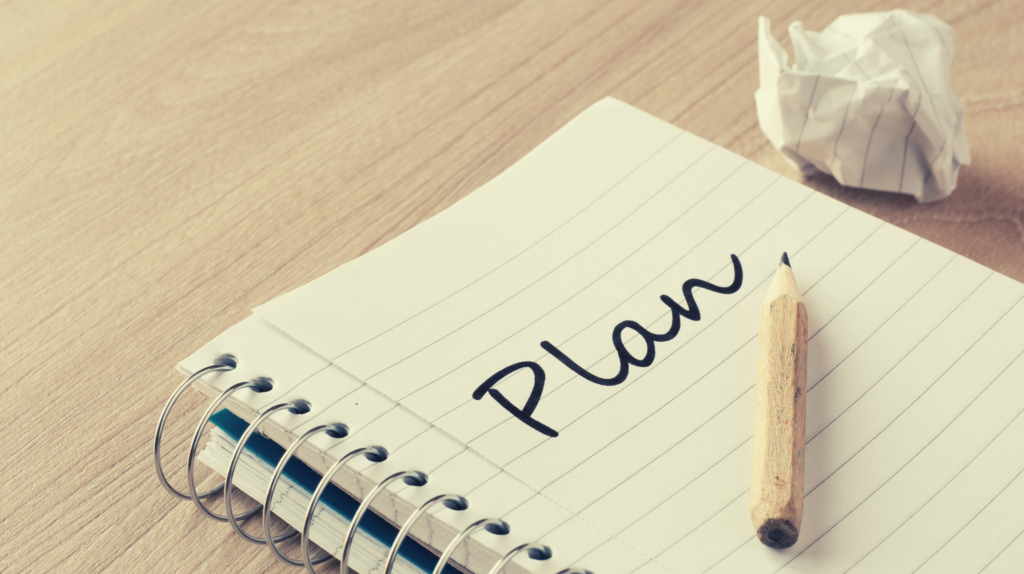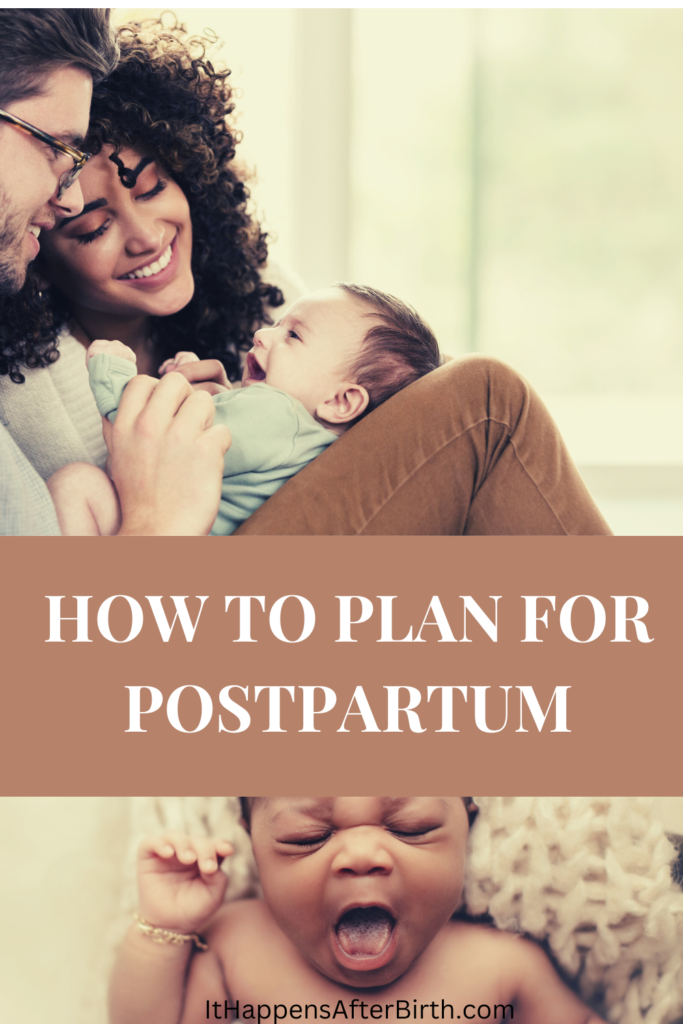Planning for birth is something that most parents do almost as soon as they find out they’re pregnant- but how do you plan for postpartum?

When you find out you’re pregnant, there’s a lot of emotions going on. However, there’s one thing that’s guaranteed- you’re going to be making a lot of decisions over the next several months.
It’s understandable that almost 100% of our focus turns to the birth. Pregnancy is a journey, and birth feels like the finish line. The pinnacle. Not to mention it’s one of the most important events in our lives: There may be a lot of things people forget through life, but ask them to describe their birth? They remember vivid details, even if it’s been a few decades.
It’s easy for thoughts of postpartum to get pushed aside. But the truth is, postpartum is just as hard, if not harder, than your actual birth. It may not be as intense moment-by-moment, but the amount of work, difficulty, and emotion surrounding it is just the same.
So in the middle of planning for your birth (which is important), how do you plan for your postpartum?
Be realistic
Take some time to look into postpartum and what it will actually be like. We may imagine it as this glowing time where we’re bonding with our newborn, falling deeply in love with our new version of life. We think it’ll be baby snuggles, oohs and aahs from loved ones, and a little bit of exhaustion.
(Check out my post on what postpartum is really like here.)
Realistically, postpartum is a complex time that can absolutely be filled with all those wonderful things, but also with things like:
- Infection
- Feeding troubles (whether you’re breastfeeding or using formula)
- Mood disorders
- Sleepless nights
- Unexpected health problems
- Trouble adjusting
- Relationship problems
- Difficulty bonding with baby right away
There is no way to predict how your postpartum recovery is going to go. But it is a good idea to look into all the possibilities so that you’re more prepared for them when the time comes.
Make a list
You might be making a plan for your birth, or you might be making a list of preferences. Either way, you’re going to have some idea of how you would ideally like your birth to go.
It’s a good idea to follow that same model for postpartum. Imagine your postpartum experience. What does it look like for you? Are you breastfeeding? Bottle feeding? Do you want lots of visitors in the first week, or do you want to be left alone? Do you want to spend most of your time in bed? What does the food situation look like for you? How do you best recover from things? What happens if things aren’t going according to plan?
Make a list of what you do (and do not) want to be happening during your postpartum. Be very honest about it, too. You’re the one who’s going to be recovering, and it’s your opinion that matters. Don’t feel pressured by outside influences that will tell you isn’t okay or doesn’t work for them. It’s not about them.
Learn what you need to learn
This is going to vary depending on what choices you’re making as you plan for postpartum. If you know that you’re going to choose to breastfeed, it’s a good idea to look into the workings of breastfeeding and what’s helpful to know ahead of time. Same goes for formula feeding and pumping.
If you know about the possibility of a mood disorder and you’re worried it might happen to you, look into the signs of PMADs and where you should turn for help first.
If sleep is the most important thing on your list, spend a little bit of time learning what biologically normal infant sleep looks like. And find out now who will come and help with baby when you really need to catch up on your rest.
Basically, the most important piece of advice when it comes to a plan for postpartum is this: Don’t ever assume that everything will fall into place on its own, or that it’ll be easy to find a solution on the fly.
Believe me, your exhausted postpartum self will thank you later.
Gather resources
Now that you have an idea of what you want your postpartum to look like, it’s time to find the people and resources that will save you when you’re in the thick of it.
To use breastfeeding as an example again- if you know you want to breastfeed, and you’ve learned that the majority of women quit breastfeeding within the first six weeks after birth, look around and see if there are any IBCLCs or lactation counselors in your area. Write down their name, what they do, and their phone number, and stick it on the fridge (or anywhere it won’t get easily lost/you’ll remember where you put it.)
Make a list of people to call when you need help with watching the baby, a meal, or just moral support. Sometimes it’s the people who let us cry and vent all of our frustrations without judging that are the most helpful, so put them at the top of the list!
Aside from the people who will help, gather all of the items and objects you’ll need for your postpartum also. Think of your physical, emotional, and practical comfort.
Physically, what do you want to have on hand for tears, incisions, or cracked nipples? After pains (continued contracting of the uterus the first few days postpartum) can definitely be uncomfortable- is there anything you want to have on hand for that? Do you have safe pain medication to take if you want it? You might also want to gather supplies for a sitz bath or anything else that will help your physical comfort after giving birth.
When it comes to practical items, you might need to get a breast pump, bottles, or stock up on certain kinds of formula. Little things like lip balm, hair ties, and tissues in a little basket can be very helpful too.
Anything else that you’d like for your emotional comfort, make sure you pick it up before having your baby so you have it on hand right away for whenever you might need it.
Have some conversations with your partner
You are the most important person in your postpartum plan, but the second most important in this whole situation is your partner. As you’re researching, deciding, and gathering, make sure that you and your partner are on the same page every step of the way. Remember, this is a life changing event for the both of you. Partners are going through as much of an adjustment (and even risk for a mood disorder) as you are.
Communication can be difficult, but it’s so, so important. Everything about your postpartum will be made that much easier if you have the full support of your partner. Which you should- you’re both in this together.
Talk to your partner about common postpartum complications and decisions and get their input. Talk through all these important topics together, things like:
- what to do when you’re both exhausted
- how you want to handle feeding
- what boundaries you’re going to have with family and friends
- how you’ll approach your new relationship dynamics
- how you want to handle returning to sex after baby
- what’s important for both of you to feel like you’re being heard
- what’s the next step if one or both of you start developing depression or anxiety
It might feel awkward or unnecessary to bring up these topics now, especially since every parent hopes things will go smoothly (for birth and postpartum). But making these decisions ahead of time, and being united with your partner on a plan, will make these situations less stressful if or when they do arise during postpartum.
Be flexible
Once you’ve read, researched, talked, and prepared, there’s one thing left to do.
Go through postpartum.
Like anything in life, it’s not going to go exactly according to plan. It might be better than you were hoping, or more difficult than you’d wanted.
It’s as unique to you as your birth is, and impossible to plan for completely. But if you follow the steps outlined above, you’ll have a good foundation on which to start to navigate your postpartum journey- a journey that could take three months, or three years.
One thing to keep in mind: there’s no correct way to “do” postpartum. There is no single timeline for recovery. And there is definitely not a tell-all handbook (as much as we might like one some days!) Be gentle with yourself as you heal. Learn to love your baby, your new life, and your new self. On your own time, and in the way that works best for you.
Did you plan for your postpartum? What was your experience like?

